 Image caption
Real Madrid's Ronaldo (left) and Barcelona's Lionel Messi are the two biggest names in La Liga
Image caption
Real Madrid's Ronaldo (left) and Barcelona's Lionel Messi are the two biggest names in La Liga
Spain's
top football division, La Liga, must be such a worldwide sporting
attraction that it is able to deal with stars Ronaldo or Messi moving
on, says the league's president.
Javier Tebas says that either player could leave La Liga "within three seasons, and we need to be ready for that".As part of its financial and global expansion plans, the league is looking to build a stronger presence, not only in traditional markets such as South America, but also in new regions such as China.
Liga de Futbol Profesional (LFP), to give it its formal Spanish name, and which operates the top two divisions in the country, is opening offices in Beijing and Dubai, and plans to do so in Johannesburg and New York in the near future.
"We need to be present where our groups of fans are," says Mr Tebas, with each of the above locations being regions where major European clubs are looking to expand their presence.
"We will have different strategies for different parts of the world," adds Mr Tebas. "For example, sport is not 'lived' in Asia the same way it is in Europe, but we have a strong [football] base that is common to all."
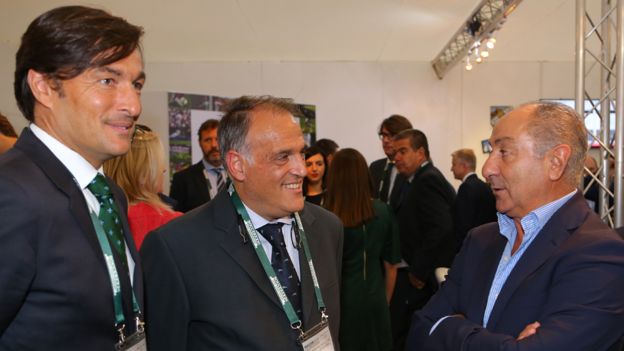 Javier Tebas (centre) admits that La Liga needs to focus more on attracting
Javier Tebas (centre) admits that La Liga needs to focus more on attracting "So in China we have a signed a partnership with [online video provider] PPTV, which is working a lot in the smart phone area," he says.
Premier League threat
However, Mr Tebas is under no illusions of the challenges and global competition that La Liga faces.He says not only are they competing with England's commercially formidable Premier League, but also from other sports such as NBA basketball, and F1 motor racing.
Using another analogy, he also says there is a danger that the Premier League will be the Ferrari of club football, and the Spanish League would the "Dacia", a budget-priced Romanian car.
But Mr Tebas adds that La Liga has given itself a stronger financial structure by moving to a new collective TV deal, which was signed in April this year, and comes into effect from season 2016/17.
The aim is to share cash out more fairly in Spain's top two divisions
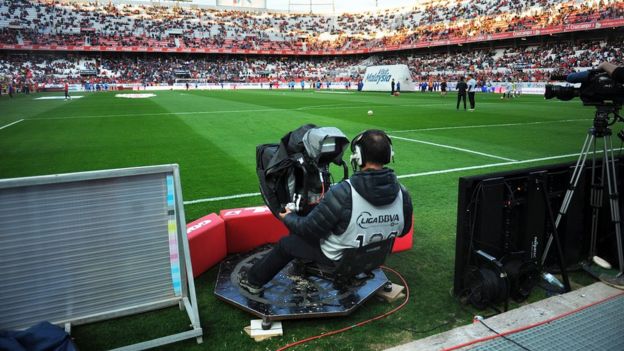 A new collective TV deal in Spain may weaken Real Madrid and Barcelona's dominance
A new collective TV deal in Spain may weaken Real Madrid and Barcelona's dominance
Critics have said that the new deal is still unfairly weighted towards the big two, and there was a player strike threatened in protest at the end of last season, which was eventually suspended by a court ruling.
However Mr Tebas, speaking at the Soccerex football business convention in Manchester, insists the new TV deal is a massive step forward.
"This was a dream for the small clubs, to overcome the differences between the really big, and the smaller, and the huge differences in TV rights," he says.
"We now have a fairer deal for all and that has therefore strengthened our competition. It means a new future for Spanish football."
More TV money?
Mr Tebas says that 41 out of the 42 professional teams in Spain backed the deal. With Real Madrid being the only club to object.And he says that the difference in TV revenues between the smallest and biggest clubs would now be 1:3.5, whereas previously it has been 1:13.
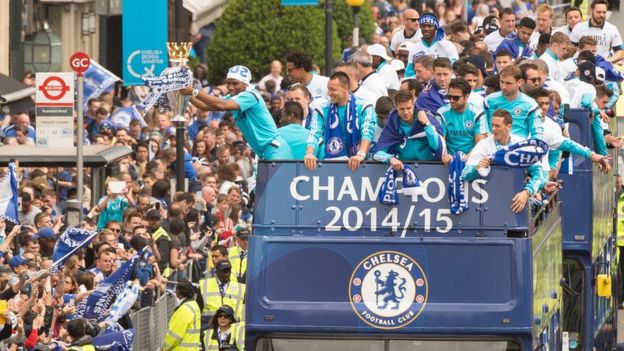
It paid 600m euros (£434m) for the domestic rights for Spain's first division (Liga BBVA), and second division (Liga Adelante), as well as the pay-per-view rights to air the Spanish Cup.
"I am convinced we will get 900m euros the next time," says Mr Tebas.
The 53-year-old lawyer says that the league now has a solid platform to also expand its broadcasting revenues strongly in two other directions, into overseas markets, and into increased pay per view sales in Spain, where figures lag behind those in England.
Mr Tebas has also endeavoured to clean up debt at Spain's football clubs, particularly to Spanish government authorities, by bringing in strict economic controls.
In their first year of operation, debt to Spain's Inland Revenue had been reduced by 14%.
"This was the main issue for our industry," he says. "We couldn't keep going with our clubs in an endless near-bankruptcy position.
Meanwhile, Mr Tebas is at loggerheads with Uefa and Fifa over the matter of third party ownership (TPO). Fifa has banned the practice, and Uefa has called it a form of "slavery".
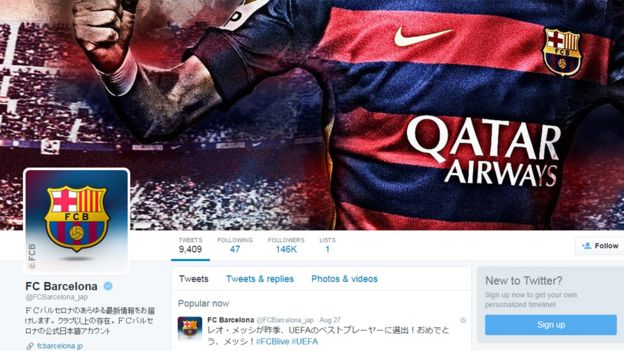
"If Spanish clubs cannot get investors to help them buy players then they cannot compete with the Premier League," he says.
"If we think there is a risk of young players being exploited, then we can regulate, if we think players might be forced into a transfer against their will, then regulate. We can also ban funds being based in tax havens. But the prohibition of TPO is ruining smaller clubs."
Player duel
Mr Tebas says that there are still two years left of his six-year-plan to turn around the finances of Spanish league football."One of my remaining challenges is… where is the AV [audio visual] market going to?" he says.
"Digital is important, we have to be well-situated for this way in which football is going to be consumed in future.
"Until two years ago our fans wanted to watch football on TV, but now they want to 'feel it' through things like social media and statistics."
He says a number of social media strategies were being drawn up for the home and international markets.
"La Liga needs to be more than Lionel Messi and Cristiano Ronaldo," he says. "We are selling this duel between them to the world, but we need to sell different concepts.
"We need to sell ourselves as an international brand."
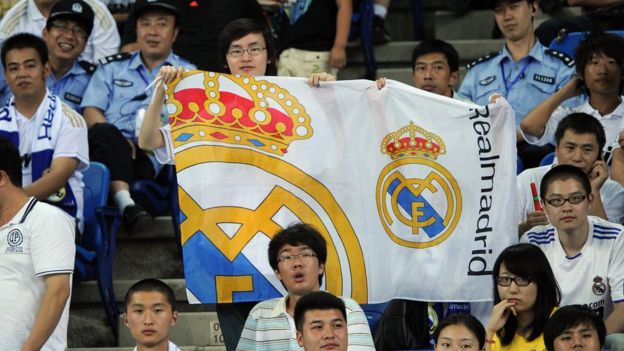
No comments:
Post a Comment